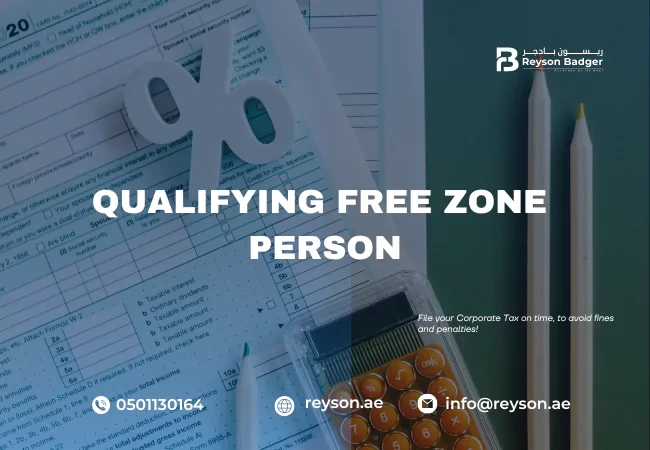

A Qualifying Free Zone Person is a business entity that generates sufficient substance, produces income specified by the Cabinet, and maintains the necessary documentation. When a Free Zone person earns non-qualifying income, they are liable to 9% tax. However, if the total non-qualifying income is not more than 5% of their total revenue or less than AED 5 million, then they will be exempted. As a result, revenues from foreign permanent establishments operating within a Free Zone will be subject to full 9% taxation
As stated in the law, A Free Zone is a designated and defined geographical area within the state that is specified in a decision issued by the cabinet at the suggestion of the minister. In recent years, Free Zones have become increasingly popular among businesses and entrepreneurs seeking to utilize unique economic benefits and simplified rules environments. But what exactly is a Free Zone, and how can one qualify as a Free Zone Person (QFZP)? This blog aims to provide a complete overview of the criteria, benefits, and processes associated with becoming a Qualifying Free Zone Person.
A Free Zone, also known as a free trade zone, is a designated area within a country where businesses enjoy special economic regulations that differ from the rest of the country. These zones are typically established to attract foreign investment, boost trade, and stimulate economic activity. Free Zones offer various incentives, including tax exemptions, simplified customs procedures, and more flexible business regulations. They are strategically located to facilitate international trade and are often equipped with Advanced facilities to support diverse business operations.
Understanding the fundamental aspects of Free Zones is essential for grasping the significance of becoming a Qualifying Free Zone Person. This status not only provides access to these economic benefits but also aligns businesses with a framework designed to enhance operational efficiency and global competitiveness. In the following sections, we will explore the specifics of qualifying for this status, exploring the criteria and the numerous advantages that come with it.
According to article 3 of the law, corporate tax on Qualifying free zone, Person will be applicable at the following rates
From the above requirement of the law, It is clear that CT applies to the free zone persons, and the tax rate can be zero percent and nine percent based on the nature of the income. Since the free zone persons are taxable, they are liable to comply with the CT law.
A Free Zone Person refers to an individual or entity operating within a designated free zone, benefiting from unique regulatory, tax, and operational advantages. These zones are established to attract foreign investment and boost economic activity by offering incentives such as tax exemptions and simplified business procedures. Understanding the distinctions between a Natural Person and a Juridical Person within these zones is crucial for Understanding the full scope of Free Zone operations.
Natural Person: A Natural Person in the context of a Free Zone is an individual who engages in business activities within the Free Zone. This individual can be a freelancer, an entrepreneur, or a sole proprietor who operates under the free zone's regulatory framework. Natural Persons benefit from the free zone's incentives, such as 0% corporate tax on qualifying income and simplified customs procedures, making it an attractive option for personal business ventures.
Juridical Person: A Juridical Person refers to a legal entity, such as a corporation, partnership, or any other organization, that is recognized by law as having its own legal rights and obligations. These entities operate within the Free Zone under specific regulations that afford them various benefits, including significant tax advantages and regulatory ease. Juridical Persons in Free Zones can take advantage of a 0% corporate tax rate on qualifying income and simplified processes for business operations, facilitating growth and international trade.
Understanding these distinctions helps clarify the diverse ways individuals and entities can Utilize the benefits of Free Zones to improve their business activities and achieve greater economic efficiency.
A Qualifying Free Zone Person (QFZP) is an entity operating within a free zone in the UAE that meets specific criteria set by the government to benefit from favorable tax regulations. These entities enjoy various incentives, including a 0% corporate tax rate on qualifying income. To be recognized as a QFZP, the following conditions must be met:
Maintains Adequate Substance in the UAE
Derives Qualifying Income as Stated In the Cabinet Decision
Complies with Prevailing Transfer Pricing Rules and Regulations
Not Elected to be Subjected to Corporate Tax (CT)
Meets De Minimis Criteria
Have Audited Financial Statements
In addition to the above criteria, a Qualifying Free Zone Person must have audited financial statements. This requirement ensures financial transparency and accountability, aligning with international standards and fostering trust with regulatory authorities.
By fulfilling these detailed conditions, an entity can be considered a Qualifying Free Zone Person and enjoy the associated tax benefits in the UAE.
By using these advantages, businesses in free zones can achieve operational efficiency, cost savings, and global market reach, making free zones an attractive option for companies of all sizes and sectors.
In conclusion, Understanding corporate tax responsibilities in UAE free zones is crucial for businesses aiming to optimize their operations. Recognizing the impact of corporate tax on free zone entities is essential for compliance and strategic financial planning. Even with the benefits of zero corporate and personal income taxes in free zones, it's important to note that free zone companies may still be subject to taxation under certain conditions, especially when dealing with mainland entities. Therefore, businesses must engage with expert corporate tax services to ensure compliance with UAE tax laws and to capitalize on available tax incentives. With the right guidance, companies can utilize free zone advantages while staying compliant and financially efficient in the competitive UAE market. Reyson Badger is dedicated to helping your business succeed in the competitive environment of free zones. Trust us to be your partner in achieving sustainable growth and operational excellence through effective tax management.